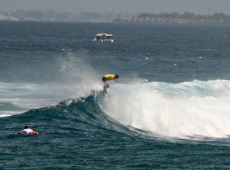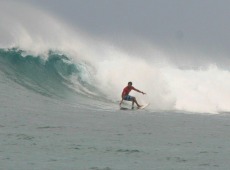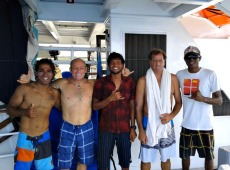Famed big wave surfer Taylor Knox dominated the Four Seasons Surfing Champions competition, winning the twin-fin, thruster and Grand Champions Final events, while six-time Maldives national champion Hussain ‘Iboo’ Areef clinched the Domestic Champions competition for the second year.
This is the third consecutive year the Four Seasons Resort at Kuda Huraa and luxury surfing pioneers Tropicsurf have hosted the contest for the ex-world champions. It is the second year Maldivian talent has competed in this prestigious event.
Six ex-world champions – Tom Carroll, Layne Beachley, Damien Hardman, Tom Curren, Taylor Knox, and Pedro Henrique – “represented the toughest field ever assembled” at the Four Seasons competition, according to the event organisers.
They competed in single-fin, twin-fin, thruster (three-fins) events that kicked off last Tuesday (August 27) at Thamburudhoo Island – home to two of the Maldives’ “premier” surf breaks ‘sultans’ and ‘honkeys’.
The two surfers who accrued the most points following the three divisional rounds qualifyied for the Grand Champions Final. Divisional and Grand Champion winners split a prize pool of US$25,000.
The evolution of the surfboard was showcased by the competition’s format, with the old school 1970s single-fin in round one, and round two celebrating the twin-fin boards that dominated during the early 1980s, while round three featured the state-of-the-art contemporary three-fin thrusters.
Knox, who retired as one of the most respected surfers on the Association of Surfing Professionals (ASP) world tour last year – aged 41 – said he achieved today what he had failed to do at the elite level.
“I could never do it on the world tour, I had to come to the Maldives and learn off these guys, and as Kelly Slater said ‘I’m one of the best surfers but not a good competitor’, but that’s changing now,” said Knox.
Single-fin division
Former three-time ASP world champion, American Tom Curren defeated former world junior champion Brazilian Pedro Henrique to win the single fin division of the Surfing Champions Trophy the first day of competition.
 The surfing legends had to contend with high winds and sporadic rain throughout the day at ‘sultans’ which forced the organisers to stop and start the event several times throughout the day.
The surfing legends had to contend with high winds and sporadic rain throughout the day at ‘sultans’ which forced the organisers to stop and start the event several times throughout the day.
“Today was difficult because the wind comes around and creates rips [on the waves],” Curren told Minivan News.
“I’ve surfed in the Maldives three times before. When conditions are good, these are some of the best waves in the world,” said Curren. “The water is beautiful, the water temperature is warm, the reefs are well shaped and swells come from far [out to sea] when its less windy.”
“It’s rarely heavy, but a lot of fun,” Curren continued. “It brings a lot of people here. The Maldives is quite a destination for intermediary surfing.”
Despite the difficult conditions Pedro Henrique was able to make the most of the four foot waves, beating defending event champion Australian Damien Hardman in the semi-final and taking second in the final.
“This was the first time I’ve surfed a single fin,” Pedro Henrique told Minivan News. “It required heavy use of the surfboard’s rail and different body balance.”
Twin-fin division
The surfing pros faced another day of difficult weather conditions and “testing but fun” three foot waves during the twin-fin division held Saturday (August 31) at ‘sultans’.
Lone female competitor Australian Layne Beachley – the only woman to win seven ASP world champion titles, and arguably the greatest female surfer in history – was literally blown off her first wave due to strong offshore winds, causing her to ultimately suffer an opening round loss.
“They were really challenging conditions out there,” said Beachley. “Never underestimate the competitive spirit of these guys, they don’t want to lose, especially to a girl. It doesn’t matter how many world titles you have,” she added.
Competition was fierce with successful twin-fin performances requiring speed and maneuverability.
Ultimately, it was big wave surfing legend Taylor Knox defeated Tom Curren to claim the divisional win.
“That was an emotional contest for me because I was surfing with all my hero’s,” said Knox. “It was just really cool today, everyone I came up against was just surfing so well.”
Thruster division and Grand Champions final
After a week of surfing in stormy conditions, light offshore winds, sunny skies and steady four to five foot surf made for a fierce final day of competition yesterday (September 1).
Beachley narrowly missed out on the semi-finals after being defeated by former two-time world champion, Australian Damien Hardman on the buzzer during the thruster division round one heat.
Ultimately Knox’s “extremely committed power surfing” in which he scored the tournament’s first-ever perfect 10-point ride and tallied the event’s highest heat score enabled him to to defeat Hardman in the thruster division final.
Hardman noted that Knox’s performance raised the bar of the entire contest.
Following the thruster division, the Grand Champions Final pitted Knox against Curren and culminated in a showdown during the final 30 seconds of the competition, when Knox scored a late 9.17 to claim victory.
Domestic Champions competition
The Domestic Champions contest kicked off last Monday (August 26) with 14 local surfers facing off on conventional thruster boards, vying for glory and the MVR35,000 (US $2275.7) prize money pool.
The competitors’ excited energy escalated during the short 45 minute trip to Thamburudhoo – the last untouched island in Kaafu Atoll with public surf break access – known for its left and right hand breaks.
While en route to ‘sultans’, local surfers from Himmafushi and Thulusdhoo islands in Kaafu Atoll appeared on ferries they had arranged to transport them from their home islands to compete.
Although conditions at ‘sultans’ were not ideal – choppy seas, rain, wind, and three to four foot “fat lady” waves – the weather and surf improved by early afternoon.
After six fierce but friendly 20 minute heats, four surfers advanced from the semi-final round to compete in the final, last year’s Domestic Champions winner and six time Maldives’ national champion Hussain ‘Iboo’ Areef, Ahmed ‘AJ’ Aznil, Ahmed ‘Ammadey’ Agil, and
to compete in the final, last year’s Domestic Champions winner and six time Maldives’ national champion Hussain ‘Iboo’ Areef, Ahmed ‘AJ’ Aznil, Ahmed ‘Ammadey’ Agil, and
Ahmed ‘Madey’ Rasheed.
“This is a great opportunity for the Maldives’ best surfers to showcase their talent alongside world legends at our ‘home break’ of Thamburudhoo – the heritage and heart of Maldivian surfing,” said Maldives Surfing Association (MSA) President Ahmed Fauzan ‘Karo’ Abbas.
Following the competition heats, Tropicsurf Founder and CEO Ross Phillips conducted a coaching session for the Maldivian surfers. They were enraptured as Phillips leveraged his 24 years of professional coaching experience to delineate the five fundamental principles of surfing: 1) weight distribution, 2) center of gravity, 3) how the surf board is used (e.g. rail transitions), 4) body rotation, and 5) extension (for speed).
“I’m very happy and willing to offer coaching [tips] and give the Maldivian surfers my time,” Phillips told Minivan News.
During the coaching session, Phillips explained that professional surfers “make it look easy, like they’re not trying” and develop their own personal style, which is “all about body movement and flow”.
“The average surfer has a lot of body movement and minimal board movement. But for the board to maximum ‘radical’ movement, body movement should be minimal,” he continued.
Phillips also explained some of the science behind surf board shaping as well as providing contest strategy tips before everyone – including Phillips – took to the water for the last surf of the day.
“We didn’t know the five principles, we tried it [after the coaching session] and it helped a lot,” exclaimed Maldivian competitor Azly ‘Dude’ Nazeem.
“It was a good experience to participate, we’ve never had a coach before. No one taught me [to surf], I’ve never had a coach in my life,” added semi-finalist, 21 year-old Hussain ‘Kuda SP’ Rasheed.
The Maldivian surfers who attended the coaching session were elated on the trip back to Male’, having experienced noticeable improvements after applying what they learned during the brief coaching session with Phillips.
Domestic Champions final
Maldivian finalists Hussain ‘Iboo’ Areef and Ahmed ‘AJ’ Aznil from Male’, as well as Ahmed ‘Ammadey’ Agil from Thulusdhoo Island in Kaafu Atoll faced off in the late afternoon after spending the day chatting with the pros aboard the Four Seasons’ luxury catamaran.
Ahmed ‘Madey’ Rasheed was unable to return from his home island in Gaaf Dhaal Atoll to compete.
Areef dominated the competition for the second year running, scoring a 10 during the trials and taking an early lead during the final. He ultimately won the competition, with Agil placing second.
“It feels great to win. I applied the contest strategies [Phillips discussed during his coaching session] and surfed smart,” 36 year-old Areef told Minivan News.
“I made sure to have an early start and caught a wave right after the buzzer. That was really good because it gave me lots of confidence and set the bar for the judges,” Areef explained. “After that I waited for good waves with scoring potential.”
His message for the young generation of Maldivian surfers is to “surf a lot, get advice from experienced people, watch surf movies, and always push the limits.”
“This competition was really good from a local point of view, it was an awesome opportunity,” third runner-up Aznil told Minivan News.
 “It was great to have a chance to hang out and talk to the champions,” he continued.
“It was great to have a chance to hang out and talk to the champions,” he continued.
Aznil, also a finalist in last year’s event, noted that the bigger, cleaner waves made for a great last day of competition.
Although this was the second year the Four Seasons hosted a Domestic Champions competition for Maldivian surfers, this was the first time the Maldives Surfing Association (MSA) – the country’s surfing governing body – was involved.
While there were some hiccups, ultimately representatives from the Four Seasons and Tropicsurf sat down with some of MSA’s leaders – who were also competition finalists – after the event to discuss how they can better involve MSA and the local surfing community in next year’s competition.
“This year was the first time communication was established between MSA and the contest organisers,” Areef explained. “We had a long meeting with these guys and they are going to better involve our members in the event next year.”
“We were not asking for much – we don’t care about money – just fair involvement for the development of our local surf community. To be given an opportunity for local judges to improve their skills, to be involved in event organising, and to gain experience from the whole event,” he continued.
“Next year will be a bigger event with better local involvement, including shadow judging, beach marshalls, and we’re hoping locals will be given wildcards to compete in the main event,” he noted.
“It was great to sit down to talk and work it out,” added Aznil.
Likes (1)Dislikes
(1)Dislikes (0)
(0)  The first question posed concerned what changes would be brought to the education system, with the host claiming that many citizens felt that while the country followed the UK system, other South Asian countries had “far better systems with a higher pass percentages”. This was followed by asking how the candidates planned to increase the number of people interested to pursue a career in teaching.
The first question posed concerned what changes would be brought to the education system, with the host claiming that many citizens felt that while the country followed the UK system, other South Asian countries had “far better systems with a higher pass percentages”. This was followed by asking how the candidates planned to increase the number of people interested to pursue a career in teaching.
 All candidates pledged to establish sewerage and water systems on all islands.
All candidates pledged to establish sewerage and water systems on all islands.


